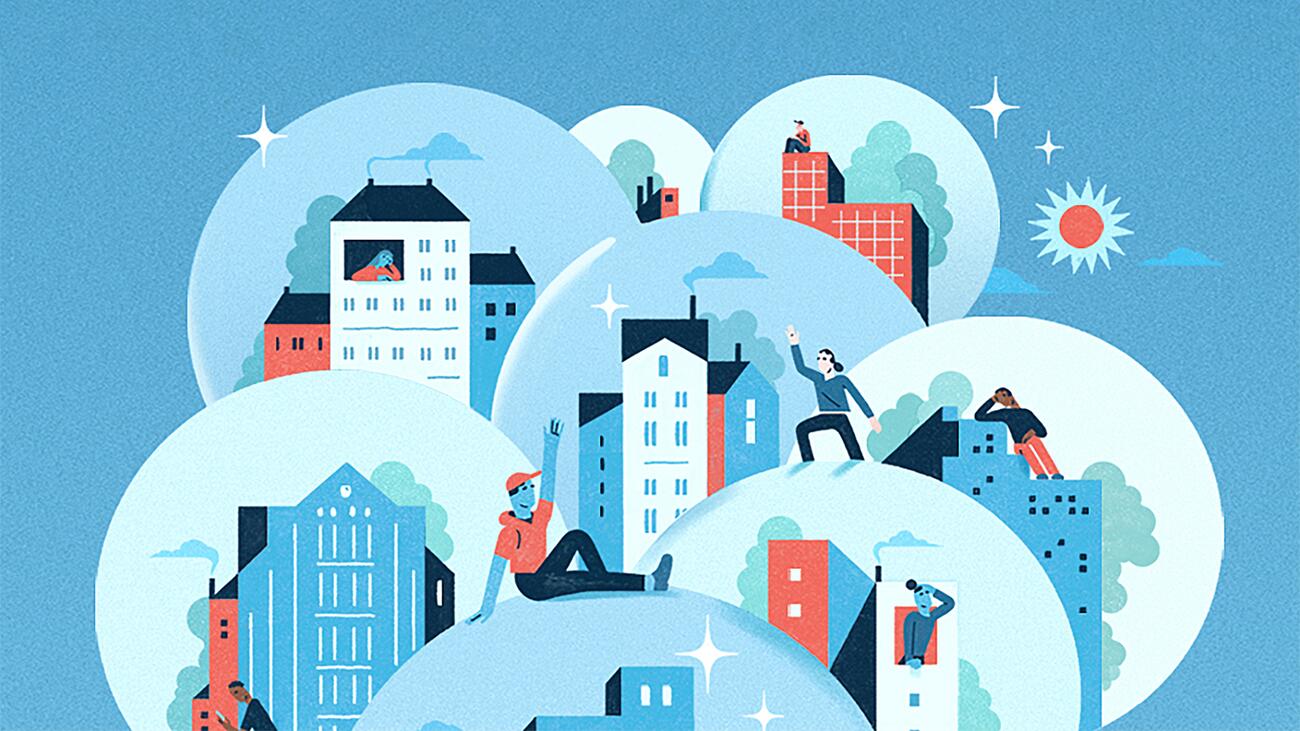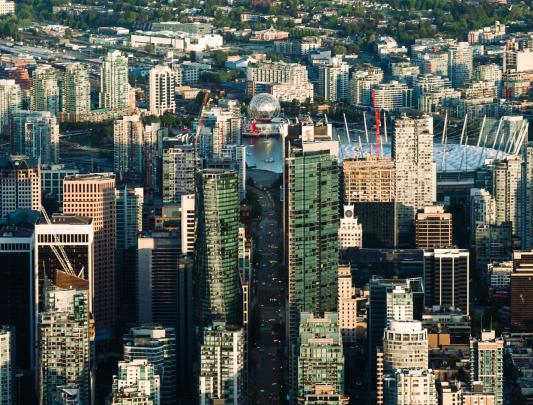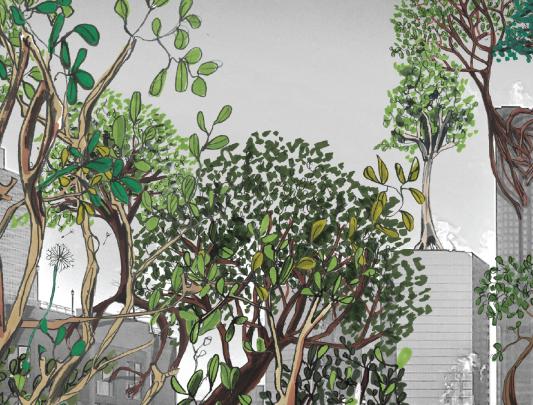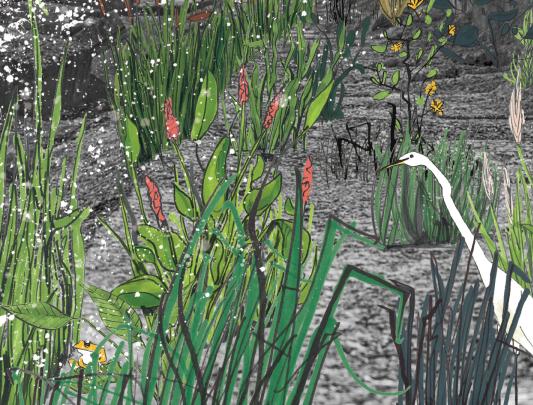
lllustration by Gracia Lam
Alone in a crowded city
As social restrictions ease, UBC philosophers and psychologists are helping us imagine a city where people feel more connected.
Years before the pandemic forced us to isolate from each other in unprecedented ways, cities were becoming worried about rising levels of loneliness. In 2012, Vancouver’s mayor launched a task force to combat loneliness in the city, in response to a survey that found one in three Vancouverites had difficulty making friends, and one in four felt alone more often than desired. In 2017, the U.S. Surgeon General declared a loneliness epidemic. The following year, the U.K. appointed the world’s first loneliness minister. Policymakers were coming up with creative solutions to connect people. And then the pandemic came, pushing this momentum in the opposite direction. The percentage of Canadians who suffer from both loneliness and social isolation increased from 23 per cent of the population in 2019 to 33 per cent in 2020, according to an Angus Reid poll.
As social restrictions ease, how do we create a city where people feel more connected? Should loneliness still be high on the agenda when we are grappling with crises like rising inequality, climate disasters, war, and a global pandemic?
For Dr. Kimberley Brownlee, a philosophy professor and Canada Research Chair in Ethics and Political and Social Philosophy, the answer is an emphatic yes. Social relationships are more critical to our wellbeing than political and economic rights, she says. And if our core social needs are not met, we won’t be able to tackle political or economic challenges.
Brownlee, a Rhodes scholar who has advised prisons on rehabilitation programs and written policy briefings on tackling loneliness, says humans are deeply social creatures who need to be cared for and to care for others to survive and flourish. “We are so deeply social that meeting our social needs – for decent human contact, acceptance within a community, companionship, loving relations, and interdependent care – is more important than meeting almost every other need we have,” she writes. Her recent book, Being Sure of Each Other, makes the case that social needs are a human right and that social deprivation is an injustice.
One obvious reason for prioritizing social needs is that loneliness is terrible for our health. For much of human history, belonging to a tight-knit social group was essential for survival, and being separated from the group was an emergency that triggered a fight-or-flight response. In small doses, loneliness is helpful in prodding us to seek human connection. But when it becomes chronic, it leads to reduced immunity, depression, cognitive decline, and increased risk of heart disease and stroke.
“Loneliness and social isolation carry a greater risk of early death than obesity, physical inactivity, and air pollution,” says Charlotte Roddick (MA’19), a PhD student in psychology who studies the link between loneliness and health. “It’s a risk equivalent to smoking 15 cigarettes a day.” Roddick adds that it’s not just a problem affecting older, isolated adults; research increasingly suggests that young adults aged 16-24 have the highest rates of loneliness of any age group.
Why city dwellers are lonelier
Urban loneliness is often linked to population mobility, cost of living (which can lead to a poor work-life balance and less time for a social life), and a high percentage of people living alone. Young adults who move to a new city for university or for work may find themselves experiencing loneliness for the first time as they leave existing social ties behind and struggle to establish new friendships. “In a large city, there is little that unifies us unless we actively seek out clusters and create sub-identities based on interests or culture,” adds Brownlee.
The challenge, she notes, is that chronic loneliness can increase defensiveness and mistrust towards others, which causes people to avoid social interactions, even if they are suffering from social deprivation. Sociability is also a muscle. The less we interact with others, the harder it is to gauge reactions, and the more social situations become stressful instead of nourishing. The pandemic has exacerbated this for many people.
One obvious reason for prioritizing social needs is that loneliness is terrible for our health. For much of human history, belonging to a tight-knit social group was essential for survival, and being separated from the group was an emergency that triggered a fight-or-flight response.
Brownlee says loneliness has significant knock-on effects for cities, since chronically lonely people are less likely to participate in actions that might improve their community. “COVID’s actually been quite damaging to whatever tendencies we might have had before to smile at a stranger, to have that brief chat on the bus – those little moments that are nourishing and vital to our health, and are also the cradle in which we form closer ties. When we lose the chance to connect with strangers, we’re losing out on the space to be useful, to feel needed, to form tighter bonds. If people avoid offering micro-connections to strangers, avoid reassuring others that they are accepted and welcomed, there will be long-term costs.”
Another reason city dwellers can be especially prone to loneliness is that it’s easy not to feel needed when you’re surrounded by millions of people, says Brownlee. “In a small village, if the neighbour’s house is on fire, you’re number one. In a city, there are 2,000 other people equally well placed to be the one who calls 911 or who gets the bucket to put out the fire. There can be a sense of not feeling special to any stranger.”
Many clinicians use the UCLA Scale to measure loneliness, which asks people how often they lack companionship, feel left out, or feel isolated. Brownlee and her students have proposed a new measure: one that also considers how much a person feels needed by others. Brownlee says that feeling needed is such an effective way to break out of the cycle of loneliness that cities should find ways to help people be of service, such as incentives to participate in volunteer work or community service. In the U.K., doctors can now give social prescriptions for loneliness, such as sending their patients to volunteer or sign up for an art class.
Brownlee adds that unless cities are thoughtfully designed – for example with good public spaces for people to gather, or accessible transportation – they aren’t conducive to “ambient sociability.” She argues that planners and policymakers need to consider whether the decisions they make help preserve the connections people already have and help them make new ones.
Designing high-rise living for social connection
Another scholar thinking about the importance of thoughtful urban design in helping people cultivate social connections is Iris Lok (BA’17, MA’19), a UBC PhD student in social psychology. As a happiness expert, Lok understands how critical social interactions are to happiness – even when those interactions occur with an acquaintance or stranger as opposed to a close friend or partner. “There’s a lot of work showing that people derive a lot of emotional benefits from talking to strangers, yet there’s a social norm against talking to strangers,” says Lok. “I’m passionate about finding out why people avoid talking to strangers even though it makes them feel better, and what interventions we can design that promote social interactions.”
One of the interventions she is currently working on involves designing buildings that encourage social interactions among residents. High-rise buildings are a worthy target for addressing loneliness: a Vancouver Foundation study found that Vancouverites who live in high-rises report higher levels of loneliness, have a harder time making friends, and are less likely to know at least two of their neighbours’ names.
In collaboration with a team of architects, engineers, and other social psychologists, Lok is developing a software that determines how much a given building design facilitates encounters and how many of those encounters are likely to result in meaningful interactions. Lok says an encounter is more likely to lead to a greeting or conversation if it occurs with a dog owner, with someone you run into frequently, or in a space where social norms encourage people to chat. For instance, a shared kitchen or mini library on one’s floor will likely lead to more meaningful connections than encountering a resident on the elevator or in the parking lot. Lok hopes the project will help city dwellers cultivate more connections with their neighbours.
She acknowledges that the past two years of social distancing may have weakened our ability or desire to socialize with strangers. “People tend to underestimate other people’s interest in talking to them, and COVID has added to that and made people even more cautious of talking to strangers than they were before,” she notes. “On the flip side, I think COVID has made people realize the importance of their social relationships, and made them hungrier for social interactions.”



































